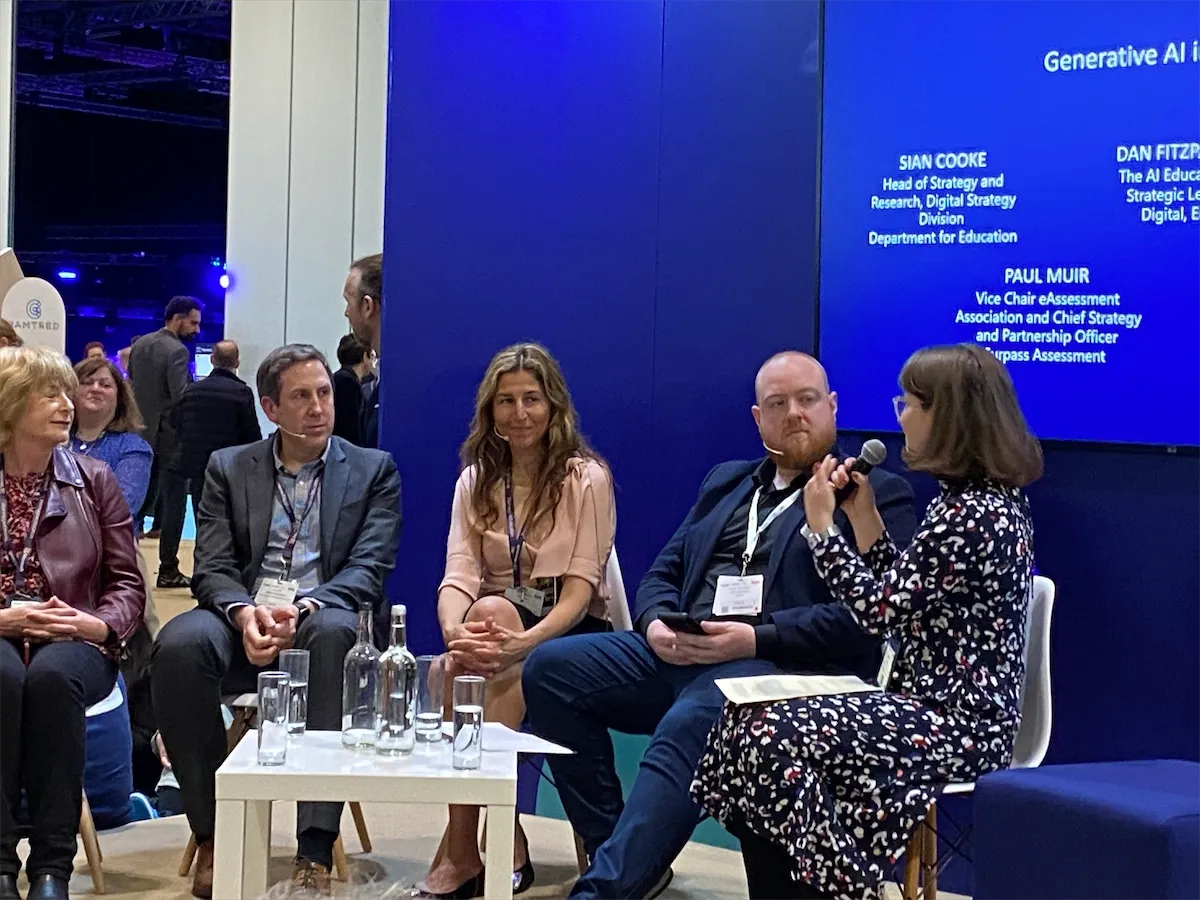This viden.ai, we have gone to BETT to investigate how far the implementation of artificial intelligence in education is progressing. BETT is a major international education fair in London, with exhibitors worldwide and over 40,000 visiting guests. Beforehand, we knew companies had not had time to work with the new technology. Still, we are a little surprised that less than a handful openly talk about artificial intelligence. We have talked to the Danish Moodle partner Moxis, who also just started with their AI-writer plugin.
We participated in a very interesting talk about the future of education and the importance of artificial intelligence in education. Below, we have gathered some of the most important elements presented and discussed during this session.
The panel sat:
- Sian Cooke, Head of Strategy and Research, Digital Strategy Division - Department for Education in the UK
- Dan Fitzpatrick, The AI Educator – The AI Educator
- Sofia Fenichell, CEO and Founder - StudyHall
- Rose Luckin, Professor of Learner-Centered Design, UCL Knowledge Lab - UCL and Educate Ventures
- Paul Muir, Chief Strategy &; Partnership Officer - Surpass Assessment
Paul Muir explained that we have been in the same problem when we went from paper and pencil to writing on the computer. He told us to see the new technology as a friend but approach it cautiously. We need to recognize that artificial intelligence can not only negatively affect teaching but that there is also positive potential. Something that we found quite interesting was when Paul Muir touched on how, in England, they are considering how to digitize their written exams, which right now are with pen and paper. Here, it was imagined that it would soon be possible to use artificial intelligence to assess students' written assignments, and thus, the digital exam would be developed accordingly.
According to Dan Fitzpatrick, artificial intelligence, in the form of ChatGPT, has surprised most people in education. Still, leading up to the launch, there had been a number of faint signs that something was coming. At the same time, he said that it is always a priority which signs to listen for and spend money on. However, it was quite clear that they had not listened and understood how technology would affect education. Paul Muir was concerned about the big difference between those who know how to incorporate new technologies into education and those who do not.
Dan Fitzpatrick emphasized that education must focus on critical thinking, communication, and collaboration skills. But there is also a great challenge in the fact that teachers do not see the new opportunities due to too much workload in their everyday lives. They are busy just being educators.

Rose Luckin was concerned that we underestimate that human intelligence is much stronger than artificial intelligence. Artificial intelligence is not knowledge, nor is the content it presents us with knowledge. At the same time, it is important to be aware that this is the first time in human history that everyone has access to play with a free, very powerful artificial intelligence. Rose Luckin said that the new technology means changing the way we teach and learn, and there is a need for AI-savvy students who can navigate an ever-changing world. What we see today will soon be the education of the past. Still, by embracing AI responsibly and safely, we can solve many problems and create a more engaging, relevant, and inclusive education for our children. In addition, there was a clear message to embrace these new opportunities and work towards an education adapted to the new reality. She concluded by saying that we need to deal with the challenges that have arisen and that lie ahead, but we need to think carefully about what we want to do with technology in the long run. At the same time, it should not only be a technology for developed countries.
The Edsafe AI Alliance would like to make a binding global agreement on the use of artificial intelligence in education:
- Transparency and explainability in AI systems learning and training
- Data usage – how AI tools use data and what data is used for
- Informed consent - accessible and clear agreements on data use, especially for minors
- Privacy – privacy and control over personal data in AI and education policies
- Security – reliable AI systems that resist threats and protect personal data
- Bias and learning limitations – processes to identify and remedy biases and limitations in AI tools
- Accountability – a model that covers both core AI tools and the ecosystem of applications built on them
- People in the loop – human feedback and oversight of AI decisions and actions in educational environments
- Verifiability – the ability to review AI systems' interactions with users (especially minors) and evaluate them
- Stakeholder support – involving educators, students, and the education community in developing AI in learning.
The 10 points can be read in full on this page:










